
November 17
1800 USA: Congress holds its first session in Washington DC, in the partially completed Capitol building.
1869 Suez Canal opens:
The Suez Canal, connecting the Mediterranean and the Red seas, is inaugurated in an elaborate ceremony attended by French Empress Eugenie, wife of Napoleon III.
In 1854, Ferdinand de Lesseps, the former French consul to Cairo, secured an agreement with the Ottoman governor of Egypt to build a canal 100 miles across the Isthmus of Suez. An international team of engineers drew up a construction plan, and in 1856 the Suez Canal Company was formed and granted the right to operate the canal for 99 years after completion of the work.
Construction began in April 1859, and at first digging was done by hand with picks and shovels wielded by forced laborers. Later, European workers with dredgers and steam shovels arrived. Labor disputes and a cholera epidemic slowed construction, and the Suez Canal was not completed until 1869—four years behind schedule. On November 17, 1869, the Suez Canal was opened to navigation. [For further information, click here]
1887 Birth: Field Marshal Viscount Bernard Law Montgomery of Alamein:
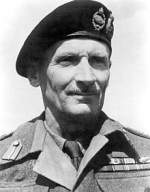
He was born in London and educated at the Royal Military College. He entered the British army in 1908 and served in the first world war 1914-1918) as a captain. In 1942, during World War II, he was appointed commander of the British Eighth Army in Africa; two months later he began an offensive at Al Alamayn (El Alamein), Egypt, which resulted in the expulsion of the German-Italian forces under the German General Erwin Rommel, first from Egypt and then from Cyrenaica and Tripolitania in Libya. In 1943 he gained another victory over Rommel at the Battle of the Mareth Line in southern Tunisia. As commander in chief of the British armies on the western front, he served under the supreme commander of Allied forces, General Dwight Eisenhower, from December 1943 to August 1944, when he was promoted to field marshal in command of British and Canadian troops. Montgomery was never popular with the majority of United States Generals.
1903 Russian Revolution: Vladimir Lenin's efforts to impose his own radical views on the Russian Social Democratic Labor Party splits the party into two factions, the Bolsheviks, who support Lenin, and the Mensheviks.
1905 Korea: Influenced by the result of the Russo-Japanese War, the Empire of Japan and the Korean Empire sign the Eulsa Treaty, effectively depriving Korea of its diplomatic sovereignty. [For further information, click here.]
1914: World War I: Various:
Germans make last stab at Ypres:
On November 17, 1914, the German 15th Corps makes a final, desperate attempt to advance against Allied positions in the Ypres Salient, the much-contested region in Flanders, Belgium.
After advancing relatively quickly through Belgium and eastern France during the first weeks of World War I, the Germans were defeated by the Allies in late September 1914 in the Battle of the Marne. The two enemies then began the so-called "Race to the Sea," moving northwards at a hectic pace in order to establish positions with access to the English Channel and the North Sea beyond. On October 19, the Germans launched an offensive aimed at seizing control of Ypres--the fortress city blocking the ports of the English Channel in Flanders--from the British, French and Belgian forces guarding it. For their part, the Allies held fast in their resistance, knowing a defeat would mean the loss of a crucial advantage.
On the last day of October, German cavalry units began a more concentrated attack, kicking the First Battle of Ypres into high gear. Over the next three weeks, the chaotic nature of the fighting only increased its bloody nature, with casualty figures on both sides mounting as the weather grew colder and more blustery. The attempt by the 15th Corps on November 17--which Allied forces repulsed--marked the last movement of the battle, as the Germans thereafter confined themselves to intermittent cannon blasts against the Allied lines. Five days later, amid high winds and blizzards, fighting was suspended completely, and the First Battle of Ypres came to an end after taking the lives of more than 5,000 British and 5,000 German soldiers. (History.com)
List Regiment: The regiment's commander, Lieutenant Colonel Philipp Engelhardt, narrowly escapes death when their primitive regimental hut is hit by a shell. Gefreiter Hitler had left the hut 5 minutes earlier and just missed being in the explosion. Engelhardt is severely wounded by shrapnel, but survives, while 7 others in the hut are not so fortunate. Georg Eichelsdoerfer: "[Engelhardt's] left hand was mutilated and a shell splinter had severed the main artery of his right thigh. Since these wounds were not immediately noticed in the excitement and because of the prevailing darkness, the resulting rapid and heavy loss of blood caused his gradual loss of consciousness, and with the words: 'I wanted to serve the Fatherland,' he sank backwards."
Lieutenant-Colonel Petz will soon assume temporary command of the List Regiment. [For further details, Click here.]

1915 World War I (Oct 4, 1915 - Feb 29, 1916): Gefreiter Adolf Hitler's serves with 16 Reserve Infantry Regiment at Fromelles. [For further details, Click here.]
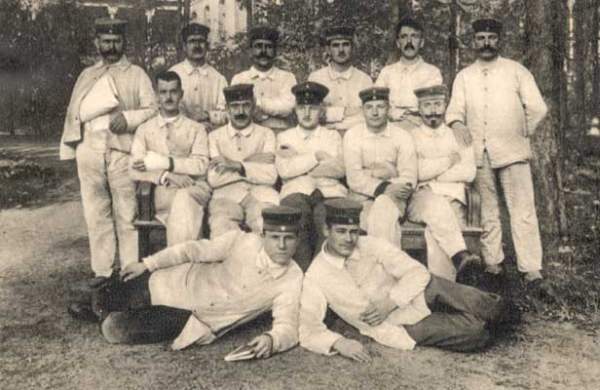
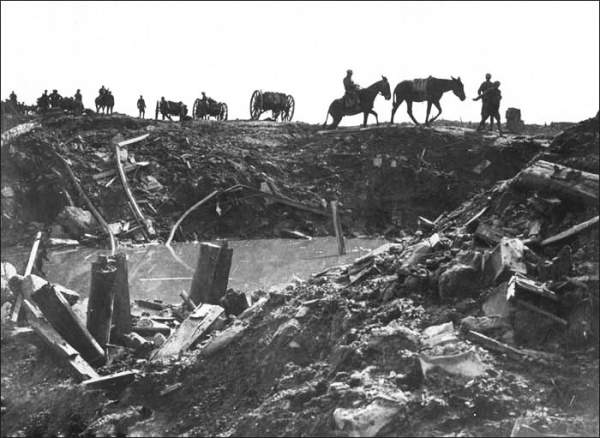
1918 Armistice: German troops evacuate Brussels:
In a forest near Compiegne (France), early in the morning of November 7, a train carrying Marshal Foch of France, his staff and British officers arrived; and another train arrived on a track close to it, with a delegation from the German government seeking an armistice. For three days the two parties discussed the terms of an armistice until 05:05 hours on 11 November 1918. Matthias Erzberger, the leader of the German delegation, and one of the new German leaders, signed The Armistice document. Within 6 hours the war would be over. The Armistice was to take effect at 11 o'clock, on the 11th day, of the 11th month.
The conditions of the armistice were put down in thirty-four articles. They were tough and uncompromising. The German army would give up all the territory it had occupied . . . . On 11 November 1918, most of Belgium was still occupied by (fleeing) German troops. That is, only some cities and villages (like Bruges, Mons, etc.) had really been liberated by Belgium or British troops. But of course, on the November 11, people of Belgium celebrated the end of war, and that they were in fact free again. Even so, the military regime and the presence of soldiers did not really and suddenly end on November 11
1932 Weimar: Franz von Papen and his Cabinet are ordered to resign:

Papen held out hope of being reappointed by Hindenburg, fully expecting that the aging President would find Hitler's demands unacceptable. Indeed, when Schleicher suggested on 1 December that he might be able to get support from the Nazis, Hindenburg blanched and told Papen to try to form another government. However, at a cabinet meeting the next day, Papen was informed that there was no way to maintain order against the Nazis and Communists. Realizing that Schleicher was deliberately trying to undercut him, Papen asked Hindenburg to fire Schleicher as defense minister. Instead, Hindenburg told Papen that he was appointing Schleicher as Chancellor.
1937 Sudetenland:
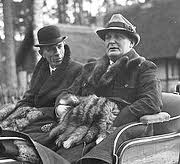
Britain's Lord Halifax arrives in Germany for talks with Adolf Hitler, said to mark the beginning of Britain's so-called "appeasement" policy toward Germany. In his diary, Lord Halifax records how he told Hitler:
Although there was much in the Nazi system that profoundly offended British opinion, I was not blind to what he (Hitler) had done for Germany, and to the achievement from his point of view of keeping Communism out of his country." This was a reference to the fact that Hitler had banned the Communist Party (KPD) in Germany and placed its leaders in Concentration Camps. Whereas Lord Halifax supported Chamberlain's appeasement policy, the foreign secretary, Anthony Eden,was highly critical.
1938 Walther Funk:

"State and economy constitute a single unit. They must be directed according to the same principles. The best proof of this is given by the most recent development of the Jewish problem in Germany. One cannot exclude the Jews from political life and yet let them live and work in the economic sphere."
1941 World War II: Various: Alfred Rosenberg is appointed to head a new Reich Ministry for the Occupied Eastern Territories: 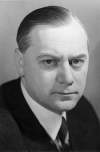
The organization of these administrative territories led to conflict between Rosenberg and the SS over the treatment of Slavs under German occupation. Rosenberg was appalled at the displacement, enslavement, and sometimes genocide of non-Jews in occupied Eastern countries. As Nazi Germany's chief racial theorist, Rosenberg considered Slavs, though lesser than Germans, to be Aryan. Rosenberg often complained to Hitler and Himmler about the treatment of non-Jewish occupied peoples. He made no complaints about the murders of Jews.
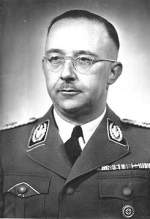
Holocaust: Himmler telephones Heydrich and tells him about the results of his meeting with Rosenberg, the situation in the Government General, and the "elimination of the Jews."
Japan: Prime Minister General Tojo outlines a three-point plan he claims is aimed at peace in East Asia.
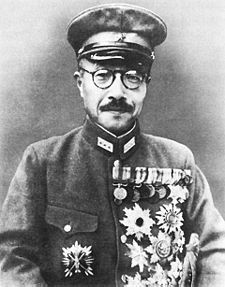
The Emperor summoned Tojo to the Imperial Palace one day before Tojo took office. Tojo wrote in his diary, "I thought I was summoned because the Emperor was angry at my opinion." Tojo was given one order from the Emperor: To make a policy review of what had been sanctioned by the Imperial conferences. Tojo, who was on the side of the war, nevertheless accepted this order, and pledged to obey. On November 2, Tojo and Chiefs of Staff Hajime Sugiyama and Osami Nagano reported to Hirohito that the review had been in vain. The Emperor then gave his consent to war. [See: Countdown to Infamy: Timeline to Pearl Harbor.]
Japan: Joseph C. Grew cables the US State Department that he has heard that Japan has 'planned, in the event of trouble with the United States, to attempt a surprise mass attack at Pearl Harbor.' His warning is ignored by the Office of Naval Intelligence. Grew had been a US diplomat since the early 1900s and was appointed ambassador to Japan by President Hoover in 1932. His diplomatic relations with Japan were cordial until the late 1930s, when Japanese expansionism became openly aggressive toward Asian neighbors like China. The US increased economic pressures on Japan until, in late 1939, Grew had been predicting that the situation will soon come to a head. He told Roosevelt in October 1939 that 'if we start sanctions against Japan we must see them through to the end, and the end may conceivably be war. [See: Did FDR Have Foreknowledge of Pearl Harbor?]
Death: Ernst Udet: German Luftwaffe general and World War I fighter-ace, a longtime friend of Hermann Goering and head of the German Luftwaffe Ordnance Department, commits suicide. Recent failures by the Luftwaffe, long assumed to be the world's premier air force, have recently led to an internal investigation blaming Udet's incompetent management. The Nazi government tells the public that he has perished in a flying accident. Speer: Goering was not actually blind to reality. I would occasionally hear him make perceptive comments on the situation. Rather, he acted like a bankrupt who up to the last moment wants to deceive himself along with his creditors. Capricious treatment and blatant refusal to accept reality had already driven the first chief of Air Force Procurement, the famous fighter pilot Ernst Udet, to his death.
Barbarossa: Units of 11 Armee (von Manstein) capture the eastern Crimean port of Kerch:
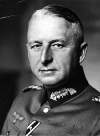
"In addition to landing descents in proximity of Kerch and Mount Opuk, GHQ ordered to land still another descent directly in Feodosiya. Two armies were to execute the operation. The descents totalled 41,930 troops who were to be landed by approximately 200 fighting ships and launches and over 300 fishing schooners, barges and even rowing boats."
1942 World War II: Various Nazi interests in the Silesian American Corporation, long-managed by Prescott Bush and his father-in-law, George Herbert Walker, are seized under the US Trading with the Enemy Act. The government announces it is seizing only the Nazi interests, leaving the Nazis' US partners, Bush and his father-in-law, to carry on the business.
Newly-uncovered government documents in The National Archives and Library of Congress reveal that Prescott Bush, the grandfather of President George W. Bush, served as a business partner of and US banking operative for the financial architect of the Nazi war machine from 1926 until 1942, when Congress took aggressive action against Bush and his "enemy national" partners. The documents also show that Bush and his colleagues, according to reports from the US Department of the Treasury, tried to conceal their financial alliance with German industrialist Fritz Thyssen, a steel and coal baron who, beginning in the mid-1920s, personally funded Adolf Hitler's rise to power by the subversion of democratic principle and German law. Furthermore, the declassified records demonstrate that Bush and his associates, who included E. Roland Harriman, younger brother of American icon W. Averell Harriman, and George Herbert Walker, President Bush's maternal great-grandfather, continued their dealings with the German industrial tycoon for nearly a year after the US entered the war.
Holocaust: The Allies warn the Germans that the killing of Jews will be severely punished:
Roosevelt did not abandon the Jews of Europe. On the contrary, he led the world-wide coalition against Nazism in a war that took fifty million lives.He marshaled American opinion against antisemitism at home and Nazism abroad. He did not ignore the passengers on the SS St. Louis, an episode much trumpeted against him. Indeed, his close Jewish friends, including Henry Morgenthau, saved all the passengers on the St. Louis. He spoke out about the Holocaust. He denounced the Nazi massacres of Jews.
Note: As always, links provided are not necessarily endorsed, but are included for their interest.
North Africa: In Tunisia, the first clashes occur between the newly landed US and German forces: Tunisia was the only Arab country to come under direct German occupation during World War II. According to Robert Satloff, From November 1942 to May 1943, the Germans and their local collaborators implemented a forced-labor regime, confiscations of property, hostage-taking, mass extortion, deportations, and executions. They required thousands of Jews in the countryside to wear the Star of David, and they created special Judenrat-like committees of Jewish leaders to implement Nazi policies under threat of imprisonment
1943 Church and Reich: Cardinal Bertram writes to the Minister of the Interior and the RHSA that the bishops have received information that the "non-Aryans" evacuated from Germany are living in camps under inhuman conditions and that a large number had already succumbed. ( THP)
1950 Tibet: Tenzin Gyatso, the 14th Dalai Lama, is enthroned as Tibet's head of state at the age of fifteen. [For further information, click here.]
1956 Spandau Prison: From Spandau: The Secret Diaries, by Albert Speer:
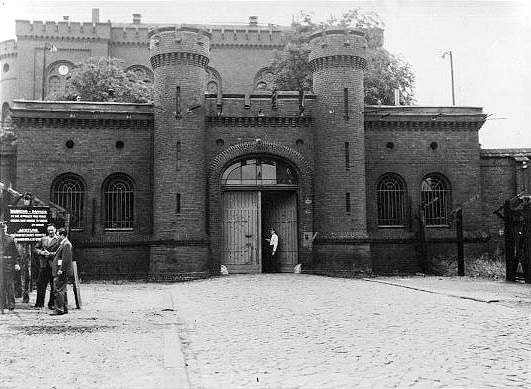
During the walk Schirach told me about extracts from Raeder's memoirs, which he has managed to read. Raeder is now creating legends about Spandau, he says. Among other things, he speaks of his friendly relations with Doenitz and Neurath during their imprisonment. In fact, bitter enmity prevailed between him and Doenitz for many years. Schirach now confides that Raeder frequently chided him when he talked with Doenitz, saying, "You should not even speak to him."
Actually it was Schirach who cheered Raeder when he was suffering from depression, helped him when he was ill. On his own initiative Schirach had several times petitioned the commandants of Berlin for the release of Raeder during the admiral's severe illness. But in hindsight Grand Admiral Doenitz and the diplomat Neurath are the only ones with whom Raeder wishes to have associated in Spandau; anyone else would harm his reputation. The foreign minister and the naval chief are in his class, so to speak; the others are mere convicts. Schirach now says bitterly, "That's how it is. As soon as someone is outside, he puts as much distance as possible between himself and those he left behind."
1962 Dulles International Airport in Washington DC is dedicated: The airport was named for the late Secretary of State John Foster Dulles and was formally dedicated by President John F. Kennedy on November 17, 1962. (The airport was renamed Washington Dulles International Airport in 1984). The ceremony was attended by former President Dwight D. Eisenhower, members of the Dulles family, many dignitaries, and thousands of spectators. [For further information, click here]
1969 Cold War: SALT I negotiations begin:
Soviet and U.S. negotiators meet in Helsinki to begin the Strategic Arms Limitation Talks (SALT). The meeting was the climax of years of discussions between the two nations concerning the means to curb the Cold War arms race. Director of the Arms Control and Disarmament Agency Gerard Smith was put in charge of the U.S. delegation. At the same time, National Security Advisor Henry Kissinger began negotiations with the Soviet ambassador in America. The negotiations continued for nearly three years, until the signing of the SALT I agreement in May 1972. [For further information, click here]
1970: Various:
Vietnam War: My Lai trial begins:
The court-martial of 1st Lt. William Calley begins. Calley, a platoon leader in Charlie Company, 1st Battalion, 20th Infantry, 11th Infantry Brigade (Light) of the 23rd (Americal) Division, had led his men in a massacre of Vietnamese civilians, including women and children, at My Lai 4 on March 16, 1968. My Lai 4 was one of a cluster of hamlets that made up Son My village in the northern area of South Vietnam. [For further information, click here]
Space: The Soviet Union lands an unmanned, remote-controlled vehicle on the moon.
1991 Battle of Vukovar: The eastern Croatian town of Vukovar falls to the Serb-dominated federal army after an 86-day siege. . . . In many places, large [numbers] of civilians were forced out by the military, in what became known as ethnic cleansing . . . the war in Croatia is variously called the War of Independence a generic term he Homeland War a direct translation of Croatian Domovinski rat or the Patriotic War.
1993 War Crimes: Judges from 11 nations are sworn in at the inaugural session of the UN Yugoslavia war crimes tribunal, the first such forum since the Nuremberg and Tokyo trials. [See: Are There Any Lasting Effects From the Nuremberg Trials?]
2005 Austria's Interior Ministry announces that British historian David Irving has been arrested on a warrant accusing him of denying the Holocaust. [See: Is It Revisionism or Denial, and Why Does it Matter?]
Edited by Levi Bookin (Copy editor) Click to join 3rdReichStudies Disclaimer: This site includes diverse and controversial materials--such as excerpts from the writings of racists and anti-Semites--so that its readers can learn the nature and extent of hate and anti-Semitic discourse. It is our sincere belief that only the informed citizen can prevail over the ignorance of Racialist "thought." Far from approving these writings, this site condemns racism in all of its forms and manifestations.
levi.bookin@gmail.com










Fair Use Notice: This site may contain copyrighted material the use of which has not always been specifically authorized by the copyright owner. We are making such material available in our efforts to advance understanding of historical, political, human rights, economic, democracy, scientific, environmental, and social justice issues, etc. We believe this constitutes a "fair use" of any such copyrighted material as provided for in section 107 of the US Copyright Law. In accordance with Title 17 U.S.C. Section 107, the material on this site is distributed without profit to those who have expressed a prior interest in receiving the included information for research and educational purposes. If you wish to use copyrighted material from this site for purposes of your own that go beyond 'fair use', you must obtain permission from the copyright owner.
Please Note: The list-owner and the moderator of 3rdReichStudies are not responsible for, and do not necessarily approve of, the random ads placed on our pages by our web server. They are the unfortunate price one pays for a 'free' website.



